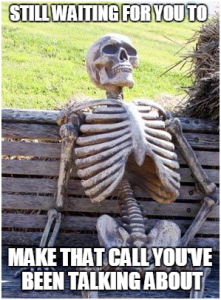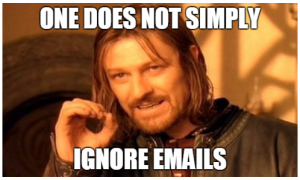Posted 31 March 2016 | 0 Comments
Make sure you can spot the difference between a help and a hindrance at work. If you mismanage your time or focus on tasks falling outside of your remit you may just find yourself missing opportunities, experiencing stressful appraisals, losing friends or even your job.
In every workplace there are various activities and interactions that seem fine and can even be useful until they dominate your focus, happen too often or distract from your objectives. We want you to have the best chance of success at work and that’s why we have compiled a list of things to keep in mind. After all, forewarned is forearmed.
Water cooler chat
Let’s start off easy. This doesn’t require much explanation so we’ll be brief. It’s nice to have a chat at work. It feels good to have people around that you actually want to talk to and unless there’s a reason for it, it’s pretty rare and draconian to have bosses who won’t allow talking at all.
Be smart. Don’t stand in full view of your boss for fifteen minutes talking about your commute or the state of some celebrity’s nose job when you’re on the clock. You can have quiet, brief conversations throughout the day. Go ahead; catch up as you get a cup of tea or copy some documents. Basically, just don’t take the p*ss.
Talking about work is not work
Of course we need to talk about work at work, communication is very important. This only becomes problematic when the talk is excessive, distracting or irrelevant.
Employee One: “I’ve heard Company X has a new product coming out. I think it would be worth contacting them to find out if they need more promotional marketing. We could help with that.”
Employee Two: “Definitely. That’s a new client right there.”
Employee One: “Thanks, I’ll do that. I remember a few years ago when another company brought out three new products in one year. Wow, what a campaign that was! I met one guy who said they’d never seen a brand grow so quickly.
This is great, really exciting. I want to land that account. I wonder if they will be interested in taking a sales call. Of course, I won’t be the only person who’s seen this opportunity. I’m going to jump on it now. Better not miss out.
So what I am going to do is call them and then I’ll say ‘Hi, I am calling from….blah blah blah…’ and then they will say ‘blah blah blah’ but that’s alright because I can say…”
ONE HOUR LATER:

What started out as a great conversation became a problem because Employee One got carried away. When this happens, the value will diminish faster than the interest / will to live of everyone else involved. We all complain there aren’t enough hours in the day and one of the leading irritations among office workers in the UK is colleagues who constantly distract them.
The point, without going on too much, is that opportunities are missed when needless over-discussing/planning becomes the focus. Ask yourself if you really need the conversation you’re having. If it’s valuable, get talking. Beyond that, while it may be work related, you are most likely wasting both your time and everyone else’s.
NOTE: Similar evils include repeating word-for-word the call you just made, asking the dreaded “have you got a sec” and talking for ages whether they had time or not, asking an otherwise valid question at what is clearly an inconvenient time or asking one person for advice and immediately having the same conversation in front of them with someone else.
Meetings about meetings
Meetings, whether you enjoy them or not, are a necessary tool in the workplace. Decisions must be made, support or feedback given and ideas discussed. As long as these meetings only involve the people they actually affect, they really are worthwhile. If you find yourself calling a meeting to repeat what you discussed last time and see if anything is new then you can simply ask “anything new?” and avoid the whole, time wasting thing. You could even do this by email and save the need for a meeting at all. Well as long as it doesn’t become a reply to all fiasco, but more on that later.
A successful meeting needs purpose. Define your objective and have an agenda you’ll stick to. Ideally, have someone nominated to chair the meeting and keep it on course. Meetings with plans are less likely to drag on for hours. Get it in, get out, get it done!
Email stealing the show
The invention of email was an immensely positive thing for business. Meetings are arranged, messages delivered, contracts hashed out and international companies united across borders in an instant because of that little envelope on your desktop.
The dark side of email however is the time sapped away by chain messages, chit chat, reply to all’s, poorly researched and irrelevant sales messages, chasers every other day for said irrelevant sales messages and the almost constant interruption that, if left unchecked, can destroy your productivity.

Do you feel compelled to check your email every five minutes? Keeping up with correspondence is a necessary part of most jobs, but when this detracts from other important activities or pops up in the corner and takes your mind off the task at hand, email can really kill your flow.
As with most things, the key is moderation. Check your emails once an hour (more or less depending on the job you do) and only increase this when you know something vital is on its way. If you’re writing an important document or (even worse) if you’re on a call or in a meeting, just don’t look. You can tell when someone has switched their focus, even over the phone, and it can mean the difference between making a sale or missing an opportunity. Honestly, it’s just rude. Is the picture of a cat from Brenda in accounts really worth it? Well that depends on how cute the cat is…
This task is your task, this task is my task
It’s common for colleagues to want the responsibilities of others that are preferable to their own. Modern offices breed an all hands on deck attitude and, in the main, that’s extremely valuable but you should avoid completing tasks that aren’t yours when you haven’t been asked to help.
This usually happens when the tasks chosen are more enjoyable than whatever you should be doing. Posting to a social media page, designing infographics for clients or creating funny memes to share on LinkedIn can be really enjoyable but if that isn’t actually your job, you shouldn’t be spending so much time on it. Even if you tell yourself it’s for work, unnecessarily focusing on a task that isn’t your responsibility is still procrastination. Even worse, you might be treading on someone else’s toes.
The rule to go by in this instance is to offer ideas and/or assistance when you have time available and only work on something if the person whose job it is gives you the go ahead to do so. – You’ll probably want to check with your manager too.
NOTE: A big thing to remember is that a new idea shouldn’t automatically mean a new priority. This goes for doing things yourself, and asking things of others. You just thought of it, but unless it is groundbreaking it may have to wait.
